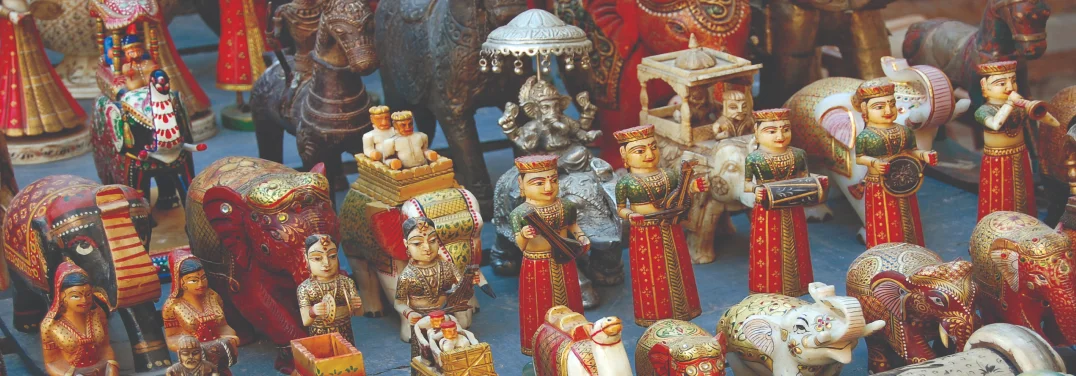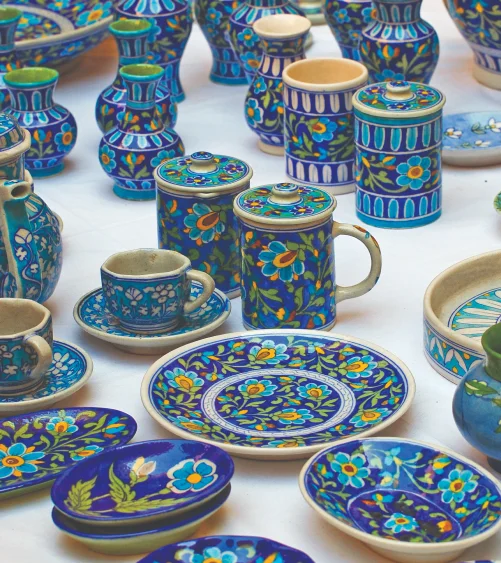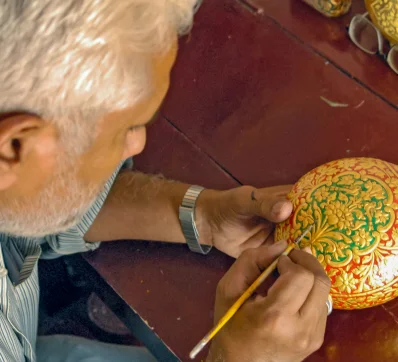HANDLOOMS AND HANDICRAFTS

INDIA LANDSCAPE
- 506 clusters sanctioned under National Handloom Development Programme (NHDP) and Comprehensive Handloom Cluster Development Scheme (CHCDS) between FY 2016 and FY 2022.
- USD 120 million investment proposed in the handloom and handicraft sector over the next five years, starting from 2024.
- USD 1.24 Mn has been sanctioned to Mega Handloom Clusters under Comprehensive Handloom Cluster Development Scheme.
- 11% of the cloth production in the country is from the handloom sector.
- 95% of the world's hand-woven fabric comes from India.
- USD 1.8 Bn of handicrafts (excluding handmade carpets) was exported in FY 2024. This was a 6.74% rise from the previous year.

Rajasthan Landscape
Sector Performance:
- State's GSDP was USD 142.61 bn in FY 2021-22, a 18.04% increase from the previous period.
- Rajasthan's exports rose to USD 91 million from USD 82 million between April and August FY 2024, making it a leading contributor to India's handicrafts exports.
- There are 6 lakh craftsmen and artisans in the State.
- In FY 2023, USD 6000 was distributed to 125 weavers towards skill upgradation.
- The state's blue pottery, marble handicrafts, hand-crafted brass items, miniature paintings, wooden artefacts, and hand-printed textiles are well renowned.
- It exports blue pottery mainly to the Middle East and America, and miniature paintings and wooden handicraft items to the US and Europe.
Rajasthan: Value Proposition for Handloom and Handicrafts Sector

- Cotton: 27.74 lakh bales of cotton was produced in the State in 2022-23, used for textiles like block prints and tie-dye fabrics.
- Wool: 1.4 billion kg of wool was produced in the State, used for carpets, rugs (durries), and woolen textiles.
- Brass and Copper: 30.85% of India's copper comes from Rajasthan, used for making traditional utensils, decorative items, and jewelry.
Rajasthan's handicraft clusters, each specializing in different crafts, are supported by the Government and private initiatives to improve quality and market reach.
- Jaipur: Known for block printing, blue pottery, and gemstone jewellery.
- Jodhpur: Famous for wooden furniture and handicrafts.
- Udaipur: Renowned for miniature paintings and marble carvings.
- Bikaner: Known for its camel leather products and intricately designed carpets.
All major locations in the state are well connected to domestic and export markets through multiple modes.
- Rajasthan provides access to around 40% of India's market in the neighboring states and serves as an indispensable medium of transport between North-Indian states and the ports on the Western India.
- All major strategic locations in the State are well connected to domestic and export markets through multiple modes. The State is served by the 3rd Largest network of national highways with 20 major National Highways. Additionally, the State has the 5th largest rail network in India. Out of the 44 Bharat Mala economic corridors, 9 pass through Rajasthan. Major cities like Jaipur, Udaipur, and Jodhpur have airports with flights to and from key Indian cities and international destinations.
- The State has 415+ well developed industrial areas, with 51,500 hectares of industrial land available (No. 4 in India)
- Over 58% of State's are within Delhi Mumbai Industrial Corridor (DMIC).
The State has many nationally and internationally reputed institutions, contributing to the growth and development of Human Capital.
- Universities: There are 88 universities, of which 53 are private universities, 28 are State funded universities and 7 are other universities.
- Nationally and Internationally renowned institutions: The State is home to numerous technical institutes, including prestigious ones like the Indian Institute of Technology (IIT) Jodhpur, Indian Institute of Management, Udaipur, Indian Institute of Information Technology (IIIT) - Kota, National Institute of Logistics and Material Management, Udaipur, National Law University, Jodhpur, All India Institute of Medical Sciences, Jodhpur, FDDI - Jodhpur, The Birla Institute of Technology & Science, Pilani etc.
- Availability of Manpower: Pool of a large young trained workforce with 62% of Indian population in the working age group of 15 to 59 years.
Policies & Incentives
Rajasthan Investment Promotion Scheme (RIPS) 2024
Asset Creation Incentives (ACI)
- Investment Subsidy (SGST Reimbursement) -75% of the State tax due and deposited for a period of 7 years OR
- Capital Subsidy -13-28% of EFCI* to be disbursed in annual instalments over 10 years OR
- Turnover Linked Incentive -1.20% - 2.0% of Net Sales Turnover to be disbursed annually for 10 years.
Special Incentives
- Employment Booster -10% - 15% booster on chosen Asset Creation Incentive.
- Training & Skilling Incentive - Skilling support in form of a Training Subsidy of Rs. 4000 per worker per month for 6 months for training delivered in Rajasthan.
Exemptions
- 100% Stamp Duty
- 100% conversion charges
- 100% exemption of Electricity duty for 7 years
Additional Incentives
- Sunrise Booster- 25% Sunrise booster on top of the ACI chosen OR
- Thrust Sector Booster - 10% Thrust Booster on top of ACI chosen OR
- 5% Interest Subsidy for period of 5 years OR
- Anchor Booster - 20 % Anchor booster on top of ACI chosen
Customized Packages
- Investment of more than Rs. 500 cr - Option to redistribute benefits among ACI (Capital, TLI and SGST reimbursement).
- Investment of more than Rs. 1000 cr and employment of more than 800 persons - Customization on a higher NPV of the Asset Creation Incentive upto 20% of the NPV of the chosen ACI.
Other unique features
- The State will also allow telescoping and upgrade the earlier set of incentives paid on a lower slab basis the total incentives applicable, once the full investment is completed.
- If a group/cluster of enterprises within the same or nearby premises (within 50 km radius), come in with a consolidated investment proposal, then it shall be eligible for cluster incentives.
Rajasthan Micro, Small and Medium Enterprises Policy, 2024
- For the execution of this Act, the Government of Rajasthan launched a web portal on 12th June 2019 for filing applications.
- Issuance of 'Acknowledgement Certificate' up on submission of 'Declaration of Intent' electronically or physically to the nodal agency.
- On basis of said certificate an MSME unit is exempted from approvals and inspections under all State laws for 5 years from the date of issuance of the Acknowledgement Certificate.
Ease of Doing Business

- RajNivesh portal provides a single point, online interface and a time-bound clearance mechanism by acting as a one-stop information / registration / approval / tracking centre for clearances / approvals.
- The platform integrates 120+ services across 14 departments, emphasizing the State's commitment to the implementation of investor-friendly policies that enhance ease of doing business and promote sustainable development.
- Officials from 14 concerned Departments of State government have been deputed to Bureau of Investment Promotion, Rajasthan for facilitation of investment proposals.
Opportunities
Opportunities across multiple Handloom and Handicraft segments are available in the state.
Tourism-Driven Demand
- Souvenir Market: With Rajasthan being a major tourist destination, there is a demand for traditional handicrafts and handloom products as souvenirs.
- Cultural Tourism: Tourists are increasingly interested in experiential travel, including workshops and tours of artisan villages.
Export Potential
- Global Market: Rajasthan's handicrafts and handlooms are well-regarded internationally, with significant export opportunities for products like textiles, pottery, jewelry, and wooden crafts.
- E-commerce Platforms: Online marketplaces offer a global platform for artisans to sell their products without intermediaries, reaching a wider audience.
Sustainability and Eco-Friendly Trends
- Natural Materials: Increasing global demand for eco-friendly and sustainable products offer opportunities for handicrafts made from natural materials like clay, wood, and natural fibers.
- Sustainable Practices: Promoting sustainable practices among artisans can attract environmentally conscious consumers.
Corporate and Institutional Demand
- Corporate Gifting: Handicrafts and handloom products are increasingly popular as corporate gifts, offering a significant market.
- Interior Décor: Hotels, resorts, and institutions in Rajasthan and beyond often seek traditional crafts for interior decoration, creating bulk demand.
Major Players in Rajasthan




